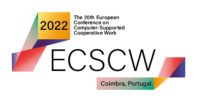Panels
Important Dates
April 7th, 2022Submissions due for panel proposals (23:59 AoE)- April 22nd, 2022 Submissions due for panel proposals (23:59 AoE)
- April 29th, 2022 Notifications to panel organizers
- May 6th, 2022 Deadline for the camera-ready version of accepted panels
- June 27th – July 1st, 2022 ECSCW 2022 conference
Submission Format & Process
Panels Chairs
For any queries, please, do not hesitate to contact the ECSCW 2022 Panels Chairs at panels@ecscw.eusset.eu.
Microsoft Research, Kenya
University of Siegen, Germany
Panels Description
ECSCW Panels aim to highlight emerging and innovative topics in the field so that ECSCW 2022 attendees can explore, engage with, and ultimately encourage the transformation of CSCW research to move in new and provocative directions. The format of a panel provides a unique opportunity to pull together a diverse range of voices to collectively offer a range of viewpoints and positions. In this way, panels act as a vital medium for the ECSCW community to discuss emerging topics and research agendas, and debate issues that may not yet become fully recognized, acknowledged, or discussed.
Ideally, panel proposals will be organized around 3-4 participants who represent a diversity of ideas and approaches related to a given topic. Topics should be novel, lively, or controversial so that they can inspire and engage conference attendees, provoke elaborative discussion, and help move forward core concerns for ECSCW research. We encourage panel proposers to identify prospective panelists who can not only share their expertise on a particular topic, but also represent diverse perspectives, disciplines, methods and approaches. Every panel should be facilitated by a moderator who will guide the conversation among panelists and engage the audience. In their proposals, we encourage panel organizers to articulate how they will creatively facilitate audience engagement and other proposed interactions during their panel session.
We invite proposals that widen the framing and understandings of computer-supported cooperative work arrangements by promoting cultural, ethnic and gender diversity. All panel submissions must include the following details:
- – A detailed treatment of the topic to be discussed, including a brief review of related literature;
- – A description of proposed panelists and their topical positions
- – A well-structured session plan, including intended organization of panelist presentations and audience interaction
- – Brief biographies of proposed panelists describing salient expertise relative to the proposed topic;
- – A provisional plan for how the panel will be run should it need to be conducted virtually
Selection Process
Proposals will be single-blind reviewed by the Panels Co-Chairs and select members of the ECSCW program committee. Selection will be based on the relevance and innovativeness of the proposed topic, the panelists’ expertise, and the plan for creative interaction among panelists and conference attendees outlined by the organizers.
Notifications of acceptance will be sent by April 21, 2022.
Publication & Copyright Information
Accepted Panel Proposals will be published in the ECSCW/EUSSET Digital Library: http://www.eusset.eu/digital-library/
The EUSSET digital library (DL) is an open access repository. The EUSSET DL does not ask for transfer of copyright from authors. The EUSSET DL does, however, require sufficient rights that allow “readers to read, download, copy, distribute, print, search and link to the full texts of articles, or use them for any other lawful purpose except where otherwise noted” (full info here: https://www.eusset.eu/digital-library/).
The authors will have several options when it comes to copyright upon paper acceptance:
In order to submit an article to EUSSET DL, the submitter must either:
- • grant EUSSET DL a non-exclusive and irrevocable license to distribute the article, and certify that they have the right to grant this license;
- • certify that the work is available under one of the following Creative Commons licenses and that they have the right to assign this license:
- Creative Commons Attribution license (CC BY 4.0)
- Creative Commons Attribution-ShareAlike license (CC BY-SA 4.0)
- Creative Commons Attribution -Noncommercial-ShareAlike license (CC BY-NC-SA 4.0);
- or dedicate the work to the public domain by associating the Creative Commons Public Domain Dedication (CC0 1.0) with the submission.
In the most common case, authors have the right to grant these licenses because they hold copyright in their own work.


